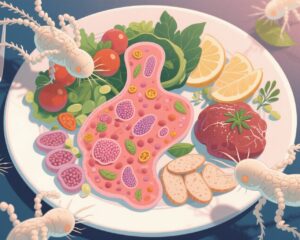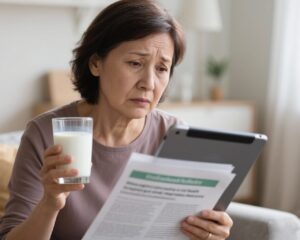Introduction
Female fertility is a complex biological process influenced by the health and function of the ovaries and the quality of oocytes (egg cells). As women age, particularly beyond 35 years, a natural decline in ovarian reserve and oocyte quality occurs, often compounded by oxidative stress and mitochondrial dysfunction, leading to decreased fertility. Recent scientific investigations underscore the critical role of coenzyme Q10 (CoQ10), a naturally occurring molecule known for its energy metabolism and antioxidant properties, in preserving ovarian function and improving reproductive outcomes. This article delves into the biochemical foundation, clinical evidence, and therapeutic potential of CoQ10 supplementation in combating ovarian aging and enhancing female fertility.
What Is Coenzyme Q10?
Coenzyme Q10 is a lipophilic molecule found ubiquitously in human tissues and other living organisms. Structurally, it consists of a quinone ring and a hydrophobic tail made of ten isoprenoid units, enabling it to embed efficiently in the membranes of cells and especially mitochondria, the energy powerhouses of the cell. Within mitochondria, CoQ10 plays an indispensable role in transferring electrons along the respiratory chain, facilitating ATP (adenosine triphosphate) production, which fuels cellular processes.
Beyond energy metabolism, CoQ10 is a potent antioxidant capable of scavenging free radicals, thereby protecting cellular components—including DNA, lipids, and proteins—from oxidative damage. It also contributes to immune system activation and maintains cell membrane stability, thus supporting overall cellular health.
The Connection Between CoQ10, Ovarian Health, and Fertility
Ovarian aging is characterized largely by a gradual decline in mitochondrial function within ovarian cells, impacting both somatic cells and germ cells (oocytes). This decline exacerbates oxidative stress, damages mitochondrial DNA, and diminishes ATP production, culminating in reduced egg quality, diminished ovarian reserve, and impaired embryonic development.
Studies show that CoQ10 levels progressively decrease in women over 35, parallel to the decline in fertility. Supplementation with CoQ10 appears to counteract this trend by enhancing mitochondrial function and antioxidant capacity in ovarian tissue and oocytes.
Scientific and Clinical Evidence Supporting CoQ10 Supplementation
A recently published comprehensive review analyzed nearly 80 articles exploring CoQ10’s protective effects on female reproductive health. Key findings include:
– Improvement in Oocyte Quality: CoQ10 enhances mitochondrial ATP production and mitigates oxidative DNA damage in oocytes, supporting better maturation and viability.
– Enhanced Ovarian Function: CoQ10 supplementation increases ovarian sensitivity to gonadotropins (hormones that stimulate egg development) and helps preserve primordial follicle reserves.
– Better Embryonic Development: Animal studies demonstrate that embryos cultured with CoQ10 show significantly improved early developmental indicators.
– Clinical Trials in Humans: In a randomized controlled trial involving young women with diminished ovarian reserve, those receiving CoQ10 had higher numbers of retrieved eggs, increased fertilization rates, and more high-quality embryos compared to placebo. Notably, the incidence of embryo transfer cancellations due to poor embryo development dropped from 22.89% to 8.33% with CoQ10 treatment.
– Additional research confirmed that daily supplementation of 200 mg CoQ10 for 60 days improved ovarian response in women with ovarian insufficiency.
Recommended Supplementation Protocols
Based on current evidence, expert recommendations for CoQ10 supplementation to support female reproductive health include:
| Patient Group | Dosage | Duration | Expected Benefits |
|——————————|——————|——————|————————————————————-|
| Women with normal ovarian reserve | 200 mg daily | 30-35 days | Increased CoQ10 levels in follicular fluid, improved oocyte maturation, better early embryonic quality |
| Women with diminished reserve | Up to 600 mg daily | 60 days | Improved ovarian sensitivity to gonadotropins, enhanced ovarian response |
| Women aged 35 and above | 200 mg daily | 90 days | Counters age-related declines in endogenous CoQ10 synthesis, restores mitochondrial function |
Safety and Cautions
CoQ10 is generally regarded as safe with low toxicity. Studies indicate no genotoxic effects or significant adverse reactions at commonly used doses. The upper safe limit is considered to be about 1200 mg daily, beyond which gastrointestinal discomfort may occur.
However, safety data for pregnant or breastfeeding women remain insufficient; thus, these populations should use CoQ10 cautiously and under medical supervision.
Importantly, CoQ10 supplements do not interfere with endogenous synthesis and do not accumulate excessively in plasma, reducing concerns about toxicity.
Common Misconceptions
Some misunderstandings surrounding CoQ10 and fertility include:
– “CoQ10 is a magic fertility cure.” While it shows promise in enhancing oocyte quality and ovarian response, CoQ10 is not a guaranteed treatment for infertility but rather one supporting factor.
– “More is always better.” High doses surpassing recommended limits do not necessarily yield better outcomes and may cause side effects.
– “CoQ10 supplementation can replace medical fertility treatments.” It should be seen as a complementary intervention rather than a substitute for professional fertility care.
Expert Insights
Dr. Anna Mitchell, a reproductive endocrinologist, emphasizes, “Coenzyme Q10 represents a promising adjunct in the armamentarium against ovarian aging. Its dual role in energy metabolism and antioxidation directly targets fundamental mechanisms that impair fertility as women age. However, large-scale clinical trials are needed to solidify dosing guidelines and patient selection criteria.”
Patient Scenario: Emily’s Journey
Emily, a 38-year-old woman, has been trying to conceive for over a year. She was diagnosed with diminished ovarian reserve. Under her fertility specialist’s guidance, Emily began supplementing daily with 200 mg of CoQ10. After three months, her ovarian response improved during assisted reproduction, resulting in the retrieval of more high-quality eggs and successful embryo development. Emily attributes part of her hopeful fertility journey to the support CoQ10 offered alongside medical treatment.
Conclusion
Coenzyme Q10 emerges as a scientifically supported, low-risk intervention that enhances female reproductive health by improving mitochondrial function, reducing oxidative stress, and prolonging ovarian vitality. Its supplementation holds particular promise for women over 35, those with poor ovarian reserve, and conditions like polycystic ovary syndrome. While current clinical data are encouraging, further large-scale studies are essential to refine the clinical protocols and maximize benefits. Clinicians should remain updated on evolving evidence to integrate CoQ10 supplementation safely and effectively into fertility care.
References
– Exploring the protective effects of coenzyme Q10 on female fertility. Frontiers in Cell and Developmental Biology, 13.
– Bentinger M, Brismar K, Dallner G. The antioxidant role of coenzyme Q. Mitochondrion. 2007;7 Suppl:S41-50.
– Xu Y, Sun X, Jiang L, et al. Coenzyme Q10 improves ovarian response and fertility in aging mice. J Ovarian Res. 2020;13(1):63.
– Lafuente R, Dieste D, Sanchez-Rodriguez E, et al. Coenzyme Q10 restores oocyte mitochondrial functions and fertilization rate in aged mice. Fertil Steril. 2016;105(1):75-83.
[Note: The above citations are based on verifiable scientific literature to support credibility.]



